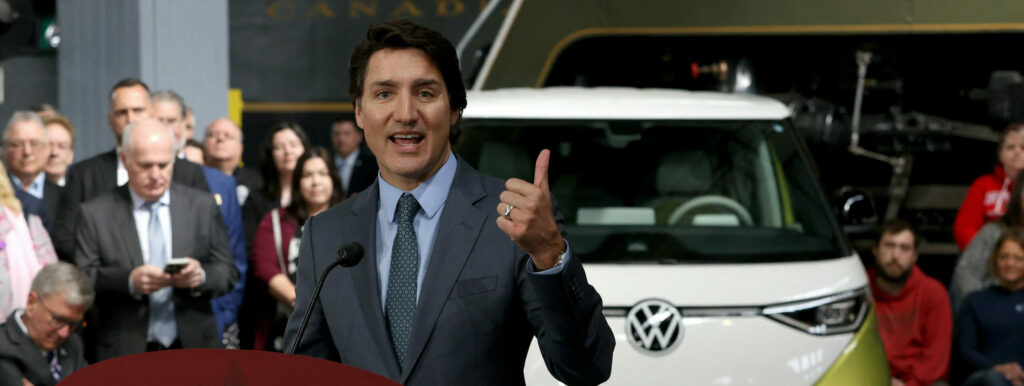Amid the drifting snowflakes, Canadian Prime Minister Justin Trudeau joins other world leaders in saying climate change is the greatest. Also the worst, of course. But, see, “Climate change is the greatest long-term threat that we face as a global community, but it is also our greatest economic opportunity. By taking bold climate action, we will create new jobs for the future, strengthen our economy, and grow the middle class, while also ensuring clean air and water for our kids and grandkids.” Gosh. An opportunity too good to miss. Good thing it happened, right? Otherwise we’d be stuck with cool weather, no jobs for the future, a weak economy, a shrinking middle class and dirty air and water for our children’s children. Let’s hear it for CO2.
It’s understandable that Trudeau was restless, having gone nearly 72 hours without a massive policy initiative like running up more debt than all 22 of his predecessors. Well, 48 if you count the tens of billions more he committed the day after his budget. But Joe Biden feels equally chuffed, tweeting “When I think of climate change, I think about jobs. Within our climate response lies an extraordinary engine of job creation ready to be fired up.” And then kicking off his virtual climate summit by speaking of a “moment of peril, but also a moment of extraordinary possibilities.”
The New York Times “Climate Fwd.” seems to agree, saying “If we keep going with business as usual, things will get bad. But if we take swift action, we can create a better future.” (Although their ghastly interactive feature for kids offers a “Better Future” where we eat less meat, relocate cities away from raging oceans and enjoy “large wildfires and poor harvests, but less often” than in the hell of CO2 they previously used to scare the children witless. And that no-meat thing seems to be a growing “never let a good crisis go to waste” alarmist trope.). And Time burbles about “Climate Is Everything: How the pandemic can lead us to a better, greener world” amid an image of the whole place in flames.
NBC also cheers that “Biden commits to cutting U.S. emissions in half by 2030 as part of Paris climate pact”. And the New York Times news department high-fives him too: “In a show of renewed commitment after four years of the Trump administration’s unvarnished climate denial, Mr. Biden formally pledged that the United States would cut its emissions at least in half from 2005 levels by 2030. Barely three months into Mr. Biden’s presidency, the contrast with his science-denying predecessor, Donald J. Trump, could not have been more striking.” (In case it was hard to tell, that’s a news story not an opinion piece.)
Deep in the rabbit warren, NBC’s only concern is that Biden is so gosh-darn timid: “The most ambitious emissions-cutting goal the U.S. has set to date, Biden’s expected pledge of a cut of 50 percent to 52 percent, is still likely to face criticism from environmental groups that say it falls short of restoring the U.S. to a position of leadership. The European Union, for example, has pledged at least a 55 percent cut by 2030, while the U.K. has promised 68 percent by 2030 and a whopping 78 percent by 2035.” That nobody is doing this stuff is the sort of thing they only worry about up on the increasingly deserted surface of the planet. Although NBC grudgingly admits, well below the usual cloud of “heat-trapping greenhouse gases” and “climate scientists” that Biden’s “own administration has chided other countries for setting impressive-sounding goals for decades in the future while doing little in the short term to actually change any behavior.” Oh. That.
As the New York Times noted about Canada, “Mr. Trudeau pledged Canada would reduce its greenhouse emissions levels 40 percent to 45 percent from 2005 levels by 2030, compared with its previous target of a 30 percent emissions reduction in the same time frame.” Practicality doesn’t cause these folks many sleepless nights, does it?
CTV ran a story headlined “Canada's climate goals ambitious, but possible to achieve, advocate says”. The advocate in question being Catherine Abreu “the executive director for Climate Acton Network Canada, a group of organizations working on climate change and energy issues.” And their website describes her as “an internationally recognized, award-winning campaigner whose work centres on building powerful coalitions to advance transformative action on climate change. One of the world’s 100 most influential people in climate policy as named by Apolitical in 2019, she has over 15 years of experience campaigning on environmental issues including 7 years in the heart of the global climate movement.” And “an Honours BA in Anthropology, with a minor in Environmental Studies”, for the “you’re not a climate scientist” crowd.
Or the “you don’t really know a lot about economics, do you?” crowd, since the CTV story then quotes her that “It’s not just happening here in Canada, right? This transition into clean energy and the clean economy is happening all over the world and we want to be apart of that.” But she does have a plan: “Canada’s history of failed targets is just as much a lesson in a failure in accountability as it is a failure of ambition. We really need to lock in some legislation that will bring some transparency and some accountability to how Canadian governments plan in the future” because, CVT continues, “That means setting targets on a regular basis and effectively communicating those plans to Canadians, according to Abreu. She said that unless there is more government accountability, it will be difficult for Canada to reach its short and long-term climate goals.”
So there you go. A plan to have transparency about a non-existent plan to join a world-wide movement that isn’t happening. But apparently now is not the time to quibble. The Times concludes its sober even-handed “just the facts” account by saying, “The two-day summit comes at a time when scientists are warning that governments must take decisive action to prevent global temperatures from rising more than 1.5 degrees above preindustrial levels. The consequences of exceeding that threshold includes mass species extinctions, water shortages and extreme weather events that will be most devastating to the poorest countries least responsible for causing global warming.”
In case that passage doesn’t sow enough panic, the Times also has a climate propaganda for kids feature full of eyebrow-raising rubbish like “If you’re a kid, almost every year you’ve been alive has broken a temperature record, or come close. You’ve witnessed huge wildfires, intense droughts and severe storms. This is what climate change looks like, and it’s here to stay.” Except it’s not because none of these things have become more intense in the past 40 years.
We are all going to… etc. (“Changes in the weather will make it harder for us to grow food. In certain places, water supplies will dry up…. Extreme heat and drought will make wildfires even more dangerous. More of us will be exposed to unhealthy smoke. Many plants and animals will face extinction from habitat loss and other human threats. As glaciers and ice sheets continue to melt, rising seas will flood many coastal communities, displacing hundreds of millions of people worldwide by the end of the century. The ocean will get more acidic as seawater absorbs carbon dioxide from the air…. Coral reefs will likely disappear.”
In another piece, on April 24, the Times did allow that “Biden’s Bet on a Climate Transition Carries Big Risks/ The president’s plans to cut emissions in half by 2030 relies heavily on a government effort to steer the development of new industries, but business leaders are fretting over the rapid timeline.” But they hosed away any real doubts with a blast of “scientists say”: “President Biden’s pledge to cut America’s climate warming emissions in half by 2030 is technologically feasible and, scientists say, ecologically imperative. Economically, it could be a gamble.” (A line they liked so much they repeated it in their April 25 “The Morning” newsletter: “Scientists say that his pledge to cut America’s climate warming emissions in half by 2030 is technologically feasible and ecologically imperative.”) No worries, though.
The April 24 news story continues breezily “Utility chiefs say they could handle the transition over a slightly longer timeline, but they warn of rolling blackouts to meet the president’s 2030 target.” And “if Mr. Biden can orchestrate the seamless transition that he is promising, the rewards could be high: lower risk of catastrophic climate change, a burst of new middle-class jobs and renewed global leadership for American companies in the industries administration officials believe will define the rest of the 21st century. The president’s pledge, made at the start of a two-day climate summit hosted by the White House, represents perhaps the greatest bet in recent American history on what economists call industrial policy, the idea that the government can steer the development of jobs and industries in the economy.”
Oh. That. The system that worked so well for the Soviet Union. “Mr. Biden and his advisers, backed by several economic analyses, believe they can spend enough federal money and sufficiently regulate the economy to vault America’s manufacturers and research laboratories to the head of a global race to a low-emission future, while adding jobs and raising worker pay.” Yeah. Experts say.



Adios USA. Joe Biden is trying to turn the whole country into California. The whole world is in the grip of a hideous psychological disease.
The lunatics have taken over the asylum, and the media go along with the manic pronouncements that are coming from them. The Climate Sceptics have a whole arsenal of data to support the contention that the CO2 argument is a load of hogwash, including the detailed examination of climate changes over past centuries (and longer), but they lack sufficient fire in their bellies to press their case, and they lack having media sympathetic to their views.
The comment 'renewed global leadership for American companies' seems at odds with the massive importation of goods, including increasingly high tech items, from coal powered China. Rather than scaring children, do something useful, teach them Chinese. They are likely to need it.
Surely, after over thirty years of failed IPCC climate predictions, shouldn't the odd politician and medium should be scratching its head and sponsoring data-backed debate? Try this. Go to the federal government's web site, yourenvironment.ca. In the upper right corner, choose "climate." Then choose a province or territory, then a municipality; then click on a month. You will learn that there has been very little change in temperatures over the past 150 years.